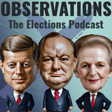
AI: An Enemy or a Friend of Democracy?
In this thought-provoking episode, Alex Iszatt explores the complex relationship between artificial intelligence and democracy. Joining us are two powerhouse guests with decades of experience in leadership, communications, and political science.
Hilarie Owen, one of the world’s leading experts on leadership and CEO of The Leaders Institute, brings deep insight from her work with global corporations, governments, and elite institutions like the RAF Red Arrows and Harvard University. With a background advising ministers and mentoring senior leaders, she discusses how AI challenges traditional power structures and decision-making in a fast-changing, disruptive world.
Angharad Planells, seasoned communications strategist and former journalist, adds a practical perspective on how narratives around AI are shaped. With experience spanning BBC radio to GE Aerospace and beyond, she shares her insights on the role of media, public understanding, and ethical storytelling in safeguarding democracy in the age of AI.
Together, they unpack whether AI is a threat to democratic institutions—or a tool for strengthening them. Tune in for a nuanced, global perspective on one of the most urgent debates of our time.
(This description was generated by AI)
